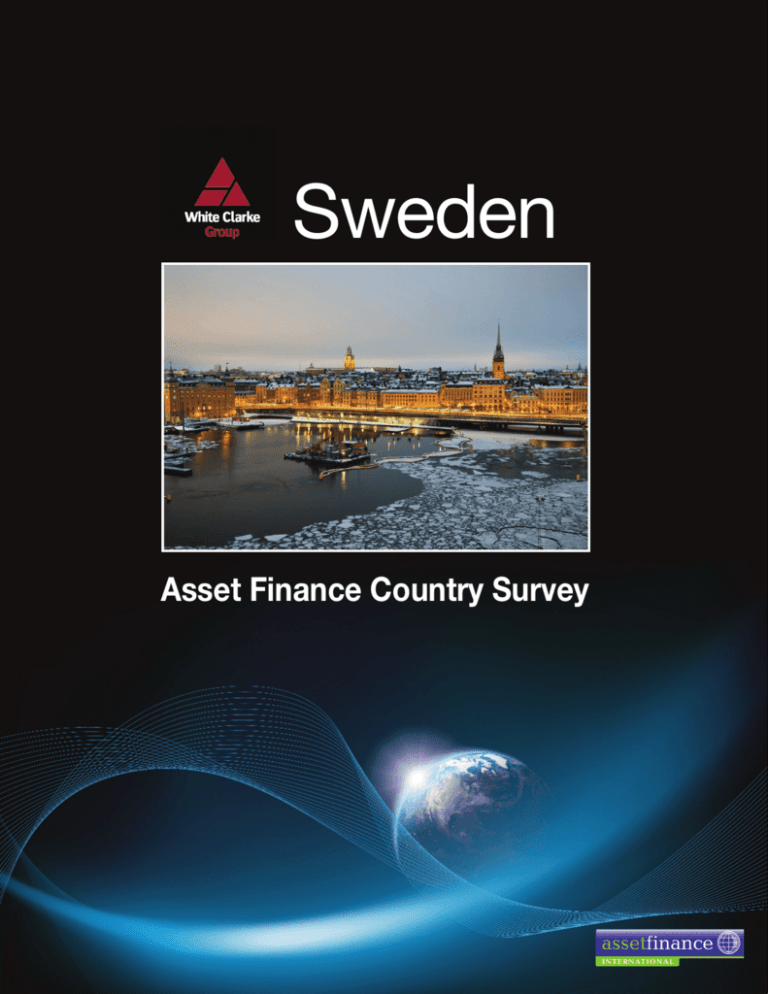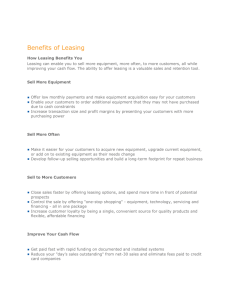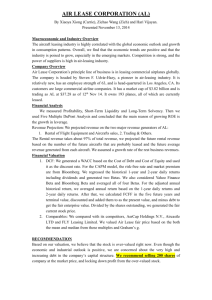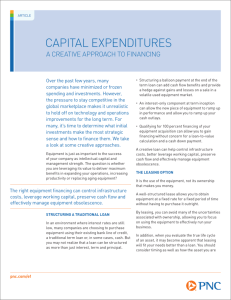
Sweden
Asset Finance Country Survey
Country report - SWEDEN
Acknowledgements
Brendan Gleeson, global sales and markeing director, White Clarke Group
Tom Ekelund, head, AFINA
Maias Wilkholm, head of corporate sales, DNB Finans
Peter Onstrand, country manager, 3 Step IT
Carl Hugo Parment, partner, White & Case Advokat AB
Oskar Hallen, associate, White & Case Advokat AB
White Clarke Group (WCG) is the market leader in sotware soluions and business consultancy to the automoive
and asset finance sector for retail, fleet and wholesale. WCG soluions enable end-to-end credit processing and administraion to streamline business pracice, cut operaional cost and deliver outstanding customer service. WCG
has a nineteen year track record of leadership and innovaion in finance technology, consultancy and new market
entry. Clients value WCG industry knowledge, market intelligence and innovaion. The company employs some 500
finance and technology professionals, with offices in the UK, USA, Canada, Australia, Austria and Germany.
White Clarke Group publish the Global Leasing Report, which is part of The World Leasing Yearbook. To order a copy
of the 32nd ediion of the World Leasing Yearbook go to
htp://www.euromoney-yearbooks.com/default.asp?page=5&pcID=15145
htp://www.whiteclarkegroup.com/
htp://www.assefinanceinternaional.com
Publisher: Edward Peck
Editor: Brian Rogerson
Author: Jo Tacon
Asset Finance Internaional Ltd.,
39 Manor Way,
London SE3 9XG
UNITED KINGDOM
Tel:+44 (0) 207 617 7830
© Asset Finance International, 2012, All rights reserved
No part of this publication may be reproduced or used in any form or by any means - graphic; electronic; or
mechanical, including photocopying, recording, taping or information storage and retrieval systems - without
the written permission from the publishers.
© Asset Finance International, All rights reserved
PAGE 2
Country report - SWEDEN
Contents
1.0
Introduction
04
2.0
Banking & leasing in Sweden
05
2.1
Leasing penetration
06
2.2
Opportunities & threats
07
2.3
Public sector
07
Regulation of leases
08
3.0
3.1
4.0
© Asset Finance International, All rights reserved
Car leasing
Introduction to Swedish law regulating asset finance
09
PAGE 3
Country report - SWEDEN
Sweden: a country that punches above its weight
Introduction
W
ith a citizenry of only 9.4 million, Sweden is not
US$149.5bn.
a very populous country, yet despite this, it
The US State Department's notes on Sweden affirm
punches above its weight as an economic hub.
that its economy “emerged from the financial crisis as one
Sweden is home to many well-respected companies
of the strongest in Europe”, despite being strongly
with proud histories of innovation and invention, from Ikea
affected by the worldwide financial crisis of 2008, which
to Scania, and Sony Ericsson to Volvo. Sweden's
“hit hard” Sweden's exports of cars, telecoms equipment,
estimated per capita gross domestic product (GDP) of
construction equipment, among other items. The
US$39,100 in 2010, according to the CIA World Factbook,
country's GDP bounced back more strongly than
puts it in 23rd place in the world rankings.
predicted, falling by 4.9% in 2009, but growing by 5.5% in
Its GDP grew by 5.5% year on year in 2010 – although it 2010, and by an estimated 4.2% in 2011.
had contracted by roughly the same amount (5.3%) the
Its recovery – good news for the leasing industry – was
year before. The Doing Business report, produced by the
helped along greatly by “strong public sector finances and
World Bank, lists Sweden as being in 14th place out of
a reliable export-driven economy,” the State Department
183 economies in terms of “ease of doing business” in
reports.
2012. This is a fall of five places from
Sweden - GDP ($ billions)
2011, where it was listed as being in
ninth place, but is still a very high
placing.
The Service sector dominates the
Swedish economy, the CIA World
Factbook says, accounting for an
estimated 71.5% of GDP in 2010.
Industry, by contrast, makes up 26.6%,
with Agriculture only 1.9%. Sweden's
largest trading partners are Germany,
the UK, and its Nordic neighbours
Norway, Denmark, and Finland. Its
exports were worth an estimated
US$160.4bn in 2010, against imports of
Source: World Bank
© Asset Finance International, All rights reserved
PAGE 4
Country report - SWEDEN
Banking and leasing in Sweden
T
he banking sector as a whole employs around
use elsewhere.
100,000 people, according to the Swedish Bankers'
One Swedish lessor said that no significant Swedish
Association, while its banks are well capitalised:
leasing companies closed their doors as a result of the
Sweden's Finansinspektionen (Financial Supervisory
recession, although many multinational companies with
Authority, FSA) announced in December 2011 that the
branches in the country dramatically scaled back their
country's banks had passed the stress tests mandated by
operations in response to a wider lack of liquidity –
the European Banking Authority (EBA), and have no need
naming specifically GE Capital, CIT, Key Equipment
to raise new capital. (By comparison, banks in other
Financing and Fortis Lease/BNP Paribas Lease Group as
European countries need to raise new capital of €114.7
examples of this.
billion in order to comply with the EBA's new rules.) The
As happened in many other countries, in response to
banking system is worth approximately four times
the global economic crisis the Swedish government
Sweden's GDP, said
Finance companies lending and leasing (Kroner/Billions)
the Brookings
Institution.
The largest banks in
Sweden took a hit
during the financial
crisis due to their
investments in the
Baltic states, which
were badly affected by
the recession. However,
recent results in
investments in this
region are more
promising, and the
Swedish banks with
Baltic investments have
seen much better
returns on investment,
Source: Finansbolagens Förening
freeing up capital for
© Asset Finance International, All rights reserved
PAGE 5
Country report - SWEDEN
prepared and implemented a financial rescue
package in 2008 which the Brookings
Institution evaluates as having worked very
well: “Credit to households was relatively
stable, and credit to companies rebounded
fairly quickly. Importantly, the financial system
survived the crisis essentially intact. All things
considered, we judge that the Swedish crisis
actions were commendably prompt and
typically appropriate. The experience in the
past crisis, moreover, augurs well for the
management of potential future crises.”
Leasing penetration
As one might expect from such a country with
such an advanced banking system, leasing is
well-established and widely used in Sweden.
Tom Ekelund, head of the Swedish leasing
association AFINA, estimates that around 20%
of all equipment investments in Sweden are
financed through leasing.
Mattias Wikholm, head of corporate sales at
DNB Finans explained that leasing is popular
among both public and private sector
companies, although multinational/blue chip
companies are slightly less likely to use asset
finance, he adds. “The typical leasing
customer,” he observes, “is a small to
medium-sized business (SMB) looking to
acquire capital goods.”
The 'usual suspects' among leased asset
types are widely found in Sweden – IT assets,
vehicles, machinery, and so on. “Usually
maintenance is not included and operating
leases are limited in volume,” Wikholm says.
Peter Onstrand, country manager for 3 Step
IT in Sweden, comments: “IT financing is used
by most customer segments, even though you
see higher levels of penetration within the midsize segment of the private sector, and by
municipalities within the public sector. Even
larger organizations tend to use IT leasing,
however often 'indirectly' through an outsourcing
arrangement/provider.”
Brokers and other finance intermediaries are not
widely used by Swedish lessors or lessees, says
Wikholm, who observes that direct contracts are
preferred.
© Asset Finance International, All rights reserved
Finance companies - % leasing
Finance companies - % other business credit
Finance companies - % consumer credit
Source: Finansbolagens Förening
Leasing is a way for forward-thinking European companies
to lower their total cost of ownership of assets, especially
technology/IT assets, says a spokesman for HP Financial
Services, adding: “Customers [who] opt for financing and asset
management services [can] help drive green initiatives.”
PAGE 6
Country report - SWEDEN
Sweden: Facts and figures
Population: 9.4 million
GDP: US$354.7 billion (2010, est.)
GDP per capita: US$39,100 (2010, est.)
Exports: US$160.4 billion (2010, est.)
Exports by type: Machinery (35%), motor vehicles,
paper products, pulp and wood, iron and steel
products, chemicals
Source: The CIA World Factbook
Opportunities and threats
Sweden is to introduce more stringent capital
requirements on its banks, according to a recent Reuters
report, although three of the country's four largest banks
(Handelsbanken, SEB and Swedbank) already meet the
proposed requirement of 12% core capital, while the
fourth bank, Nordea, which is the largest bank by value in
the Nordic region, is on its way to meeting the new target.
The Swedish central bank, the Riksbank, said in a
statement that the new measures were necessary as the
country's “concentrated” banking system meant that
“[risks] arising in a single bank's operations can thereby
easily spread to the other major banks”.
The new capital requirements could make it more
difficult for small and medium-sized Swedish companies
to access funding, Reuters reported – which could provide
an opportunity for leasing companies looking to fill the
gap, as long as they themselves have access to sufficient
capital, of course.
Sweden is not in the Eurozone, and as a result does not
have access to the liquidity offered by the European
Central Bank, leaving it “more vulnerable than many other
countries” to system shocks, finance minister Anders
Borg told a Swedish newspaper in late 2011. “That
represents a serious stability risk for the Swedish
economy,” he added. The debt crisis in the Eurozone is
also potentially dangerous for the country, as it has the
potential to threaten Swedish exports. Borg said:
“Basically all of our exports are dependent on credit-lines.
If there is no working European credit market the situation
will be very tough.”
The US State Department predicts that Sweden's
export market will grow by an annual 8% this year and
next – which is reassuring for lessors, as demand for their
services ought to remain strong.
© Asset Finance International, All rights reserved
Public sector leasing
Public sector leasing in Sweden has been threatened by
recent developments, says Wikholm: “The public sector’s
interest in leasing was mainly driven by the fact that they
could receive a discount on the offered rates through long
tax based structures, something that has decreased
substantially given the scarcity of capital funding in the
current market.”
Onstrand, however, is optimistic about the future of
public-sector IT leasing, saying: “The segment showing
the sharpest increase during the last years is laptops
provided by the schools for their students to use
('ElevPC') during classes and for homework.” Other clients
– not just public sector – have increased their demand for
leased smartphones and tablets (such as the iPad)
recently, a trend which seems set to continue as such
items become ever-more ubiquitous, and better adapted
for business use.
Overall, predictions for leasing's future in Sweden –
although a mixed picture – give rise to cautious optimism
among lessors. Onstrand says: “I do believe that we will
continue to see growth for IT leasing, in both the short and
the long term. The short term might be impacted
somewhat by the Euro crisis, but we do still foresee a
modest growth in the market. Even though growth is
projected for the long term, some warnings should be
issued in relation to impact from the proposed new
accounting standards to be implemented.” (See Asset
Finance International's special Lease Accounting section
for more on this topic.)
As it is, Sweden is in a relatively strong and stable
position, especially compared to other European
countries, and as such, the outlook for its leasing sector is
good, despite the current relative scarcity of liquidity.
Leasing in Sweden Q1, 2011
Equipment - €1.75 billion (YoY change: -22.6%)
Vehicles - €3.39 billion (YoY change: +13.8%)
Real estate - €3.2 million (YoY change: +162.3%)
Full year 2010
€9.7 billion (YoY change: +13.9%)
Hire purchase
New production: €4.3 billion (YoY change: +22%)
Total o/scontracts: €8.3 billion (YoY change: +9.8%)
Source: AFINA/Leaseurope
PAGE 7
Country report - SWEDEN
Cars - most commonly leased asset
While financial leases and operating leases are common
in Sweden, there are no statistics available which show
the most-used type of leasing. With respect to the various
types of assets most commonly used for lease financing,
cars and other types of vehicles dominate.
apply to consumer leasing arrangements.
The non-Swedish lessor who intends to do business in
Sweden would have to determine whether the proposed
kind of business requires a license from the FSA. Otherwise, there are no statutory laws governing leasing, other
than the Contracts Act and the possibility to adjust contract terms which are deemed unreasonable.
Law firms would typically become involved to prepare
standard documentation for large volume leasing deals,
and advise on large and complex leasing transactions, for
instance aircraft or railway car leasing arrangements.
Regulation
Lease financing can be provided by commercial banks
and credit market companies which are regulated entities
under supervision of the Swedish Financial Authority
(FSA). However, lease financing can also be provided by
non-regulated entities (which, however, have to register
with the FSA and comply with Swedish money-laundering Car leasing
legislation).
With respect to consumer car leases generally, a leasing
There is no body which specifically regulates leasing as
agreement would be for a two- to three-year term. At the
such, except that businesses providing short term (less
end of the term, the car will normally have to be returned
than one year) car leasing require permission from the
to a dealer for tests and valuation in order to verify that
Swedish Transport Agency.
the vehicle has been serviced correctly and that its
There are no statutory laws governing leasing as such.
mileage is in line with the lease contract. Many lessors alIn particular, leasing does not fall under the scope of the
low the consumer to elect a fixed leasing fee, or a fee
Swedish Consumer Credits Act, so lease financing rewhich can be adjusted upwards or downwards, dependgarding consumers is largely unregulated, assuming it is
ing on changes in the prevailing market interest rates (STInot intended that the lessor shall become the owner at
BOR).
the end of the lease term. If so, the Consumer Credits Act
According to case law and good practice, if the lessor
does apply. There is important case law which to some
provides for a right to increase the lease fee due to
extent compensates for the lack of a statutory law.
changes in interest rates, then the lessor must also agree
Unfair or unreasonable contract terms
to adjust the fee downwards, if market rates decrease.
may be adjusted or set aside
Book value of lease objects at end 2010 (Kr billions)
by virtue of Section §36 of the
Contracts Act. Moreover, the
Act on Contract Terms in Consumer Relations may also
come into play. The courts,
when determining whether a
contract term is unreasonable,
will presumably refer to the provisions of the Consumer Credits Act and may consider those
to be a standard for contract
terms in consumer leasing.
Moreover, the Association of
Swedish Finance Houses has
published a “good leasing
practices” set of rules which
Source: Finansbolagens Förening
© Asset Finance International, All rights reserved
PAGE 8
Country report - SWEDEN
Brief introduction to Swedish law regarding
asset finance
While financing through banks is the most
common source of external capital for business in
Sweden, an ever increasing share of financing is
made available from a variety of credit institutions.
Whereas regular banks have a broader focus,
finance companies mainly direct their business
towards corporate customers and, to some extent,
to the retail market. Both the Swedish Bankers’
Association and the Association of Swedish
Finance Houses are important member
organisations for banks, credit institutions and
finance companies.
The Association of Swedish Finance Houses
issues both ethical and good practice guidelines
concerning financing.
De-regulation
Leasing as a source of financing has been growing
constantly since the de-regulation of the Swedish
bank market in the 1980s, and today accounts for
approximately 20% of all investment financing.
Since no particular legislation or legal definition
regarding leasing exists, the legal framework
regarding asset financing is both complex and
hard to overlook.
In lack of particular leasing legislation, Swedish
law makes a legal distinction between rent and
purchase. Therefore it is important for a lessor to
make sure the agreement does not classify as a
purchase agreement. A re-classification of a
leasing agreement to a purchase agreement would
not only affect the legal relationship between the
involved parties but would also give rise to
accounting and tax implications.
In the absence of legislation, the Swedish
© Asset Finance International, All rights reserved
Contracts Act (SFS 1915:218) gives the parties in
a leasing transaction freedom to stipulate most of
the terms and conditions themselves. Therefore
the vast majority of the larger Swedish leasing
transactions adhere to the prevailing terms and
conditions used in international leasing
agreements.
It is worth noting that, except for aeroplanes and
ships, no formalities are required to transfer title of
movable property. However, to make the transfer
of title enforceable in relation to third parties, there
has to be a transfer of direct or indirect
possession. This requirement can be circumvented
by means of a registration process initiated at a
district court, something that is often undertaken
in Swedish leasing transactions.
In regards to asset financing in general, central
legalisation for both banks and credit institutions
are the Banking and Financing Business Act (SFS
2004:297) and Consumer Credit Act (SFS
1992:830). The Swedish Financial Supervisory
Authority (SFSA) issues rules and guidance, which
to a varying extent, apply to asset financing.
Implemented EU-law will also be of relevance in
most cases, for example the Act on Money
Laundering (SFS 2009:62) which states certain
“Know Your Customer” (KYC) procedures.
As a closing remark, it is worth mentioning that
the absence of specific leasing legislation makes
leasing somewhat difficult in Sweden.
Nevertheless, these difficulties are not very severe,
which is evidenced by the fact that Sweden has a
strong and healthy market for leasing transactions.
Carl Hugo Parment, partner, and Oskar Hållén,
associate, White & Case Advokat AB
PAGE 9
We deliver the world’s best software and
consulting services to the automotive and asset
finance industries
AUTOMOTIVE FINANCE | ASSET FINANCE | WHOLESALE FINANCE | LEASING | FLEET MANAGEMENT | LOANS
CALMS2 delivers fast, intuitive self-serve usability, channel
specialization and partner integration
Your route to new markets,
new customers, new revenues
CALMS2 is the end-to-end solution of choice for captive and
independent finance companies – trusted by more than 100
customers in 27 countries around the globe.
Multilingual, multi-GAAP, multi-currency, multi-business culture, CALMS2 delivers
business agility. Full back-office, middle-office and front-office integration.
True straight-through processing to help you maximize operational efficiency and
drive down cost.
The drive for continuous innovation doesn’t stop.
At WCG we really do thrive at the cutting edge
To find out more about CALMS2 technology, please email us at:
info-uk@whiteclarkegroup.com or call: +44 (0)1908 576 605
whiteclarkegroup.com
ATLANTA | LONDON | MUNICH | SHANGHAI | SYDNEY | TORONTO | VIENNA







